When your scalp itches, it quickly becomes this thing you can’t stop thinking about.
You try to ignore it – but you can’t.
The good news is that relief doesn’t always require prescription treatments or harsh products. For many common causes of scalp itch, a few simple, gentle home remedies can make a noticeable difference – sometimes faster than you’d expect.
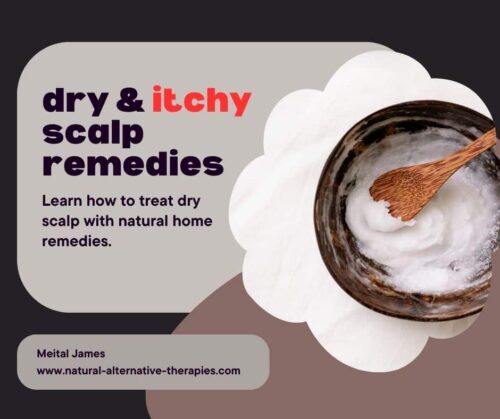
This post walks you through the home remedies that actually make sense, who they’re worth trying for, and how to use them without irritating your scalp even more.
Quick note before we start:
- If your scalp itch is mild and comes with dryness or flakes, start with Aloe Vera or Honey.
- If it’s oily, flaky, or dandruff-prone, Tea Tree Oil (or a tea tree shampoo) is usually the easiest first step.
I mention the exact products I personally use further down, so you don’t have to guess.
This post may contain affiliate links, at no extra cost to you.
Page Contents
The 5 Best Homemade Dry & Itchy Scalp Remedies
Now that you have an idea about what causes your dry and itchy scalp, we can get down to business.
But first, stop scratching! It can worsen irritation and sometimes damage the skin barrier.
1. Raw Organic Honey
Crude honey is an excellent broad-spectrum antibacterial and antifungal.
In a peer-reviewed study, published in the European Journal of Medical Research, the researchers studied the use of crude honey applied topically to 30 patients with chronic seborrheic dermatitis of the scalp, face, and front of the chest.
The patients were instructed to apply diluted crude honey (90% honey diluted in warm water) every other day with gentle rubbing for 2-3 minutes.
After 3 hours, the honey was gently rinsed with warm water.
With raw organic honey, itching was relieved, and scaling disappeared within one week.
Lesions improved substantially in the study, and some participants reported subjective improvement in shedding.
Honey has antimicrobial and anti-inflammatory properties in lab and clinical contexts, which may be helpful for some inflammatory, flaking scalp conditions.
How to Use
1. Apply directly or dilute: You can use raw honey on its own, but I recommend diluting it with a bit of warm water or some olive oil to make it easier to apply.
2. Apply the honey to your scalp and gently massage it in with your fingertips using circular motions. This helps loosen any buildup and promote circulation.
3. Leave the honey on your scalp for 3 hours. You can cover your hair with a shower cap to prevent dripping and help retain moisture.
4. Rinse thoroughly, then wash with a gentle, fragrance-free shampoo if needed.
👉 If you try this, make sure the honey is raw and unprocessed – that’s what makes the difference. This is the type I personally use
2. Essential Oils for an Itchy Scalp
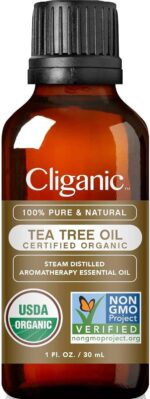
Some essential oils show antimicrobial activity.
For example, Tea tree oil has some clinical evidence for dandruff symptoms when used in a shampoo formula (but DIY results vary).
Tip: With tea tree oil, quality matters more than strength. I stick to a simple, well-sourced oil and keep the dilution low.
How to Use
1. Tea Tree Oil, Peppermint Oil & Coconut Oil – mix a few drops of Tea Tree Oil and Peppermint Oil into 1 Tbsp. of raw organic coconut oil.
Massage your scalp with it and leave it on for at least 20 minutes, then rinse with room-temperature water.
Tea tree oil, with its excellent anti-bacterial properties, may help reduce dandruff-related itch and flaking for some people, especially when used in a properly formulated shampoo.
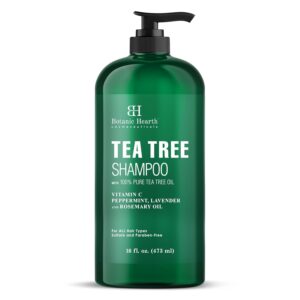
Coconut oil by itself is proven to be a natural moisturizer. It relieves dryness and associated itching.
Plus, it’s proven that the Lauric Acid in Coconut Oil Can Kill Bacteria, Viruses, and Fungi.
Dilute EOs in a carrier oil (e.g., 5–10 drops per Tbsp) and patch-test – especially with tea tree.
Start with a lower dilution if you have sensitive skin, and stop immediately if burning or redness appears.
2. Neem oil, Tea Tree Oil, Rosemary Oil, and Lavender Oil – Mix a few drops of all oils into 2 Tbsp. coconut/olive oil and massage your scalp with it.
Rinse with room-temperature water after 20 minutes.
Note: Some people can get an allergic reaction to Tea Tree Oil, so test it first (on your arm, for example) to see that you are not allergic before you use it on your scalp.
Best Organic Tea Tree Shampoos
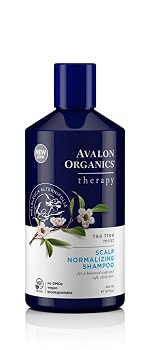
If you’re not likely to make your own essential oils treatment, I can recommend two all-natural dry scalp shampoos that contain these ingredients (and more) and are toxin-free.
My favorite all-natural shampoo for a dry and itchy scalp is Avalon Organics scalp normalizing shampoo, which is fortified with tea tree, mint, eucalyptus, and chamomile.
3. Aloe Vera Gel

You’ve probably guessed this one by yourself. Aloe Vera has had its place in the skin treatment hall of fame for decades.
Aloe vera gel can help soothe and moisturize irritated skin, and many people find it calming on a dry, itchy scalp.
It’s especially useful for scalps that feel tight, irritated, or itchy after washing.
Aloe Vera is like the hair care equivalent of a tall glass of water for a thirsty plant. It helps to moisturize and soothe dry, itchy scalps, leaving them feeling refreshed and rejuvenated.
If you can’t get Aloe Leaves, get a 100% natural Aloe Vera gel. Choose one with a high percentage of aloe and minimal additives
See the benefits of Aloe Vera on the face overnight!
How to Use
1. Use pure gel: Opt for pure aloe vera gel. You can buy it pre-made or extract it from a fresh aloe vera leaf yourself.
2. Gently massage the gel into your scalp, focusing on areas that itch the most. Apply a light coating to your hair strands as well for added moisture.
3. Allow the gel to sit on your scalp and hair for 20-30 minutes. You can cover your hair with a shower cap to prevent dripping.
4. Rinse the gel thoroughly with lukewarm water. Follow up with a gentle shampoo to remove any residue.
Repeat this process 2-3 times a week for optimal results.
Pro Tip
Freshness matters: Fresh aloe vera gel is best, but store-bought aloe vera gel works too. Choose one with a high percentage of aloe vera and minimal added ingredients (like this one I chose)
Combine with oil (optional): For extra moisture, consider mixing a few drops of carrier oil like jojoba or castor oil with the aloe vera gel before applying.
4. Foods for Dry & Itchy Scalp
One of the more obvious causes of chronic dandruff and/or dry scalp is vitamin and mineral deficiencies.
Diet isn’t the only factor, but nutrient gaps may worsen dryness for some people.
Try to eat more of the following foods to increase your intake of zinc, Vitamin A, B vitamins, and Omega-3 Fatty Acids:
- Eggs, sweet potatoes, carrots, papaya (Vitamin A).
- Whole grains, dark leafy vegetables (B Vitamins)
- Wild Salmon, Chia Seeds, Flax Seeds (Essential Fatty Acids)
- Nuts, seafood (radiation & heavy-metal free), spinach, pumpkin seeds (Zinc).
If you suspect a true deficiency, it’s worth confirming with a clinician and lab testing rather than guessing.
If you’ve tried topical fixes and nothing sticks, this is worth looking at next – ideally with proper testing instead of guessing
5. Hair Brushing
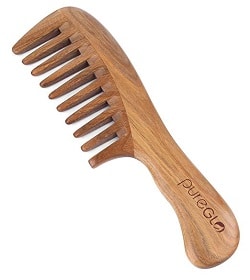
Gentle brushing can help distribute oils and reduce tangles, but if your scalp is inflamed, be gentle and avoid aggressive brushing.
But:
Only with the right kind of comb.
Wooden combs can reduce static and distribute oils (nice!).
Preferably, go for a wide-toothed wooden comb.
A wooden, wide-tooth comb is one of those small changes that’s easy to try and hard to mess up – especially if your scalp is sensitive.
How to Treat Scalp Eczema Naturally
For mild scalp eczema, some home approaches may help reduce dryness and itch – but flares often need a tailored plan.
Here are the best remedies in my experience:
- Coconut oil – a thin layer of coconut oil applied to the affected area helps relieve eczema itching and pain.
- Magnesium oil – for me, rubbing some Magnesium oil on the scalp can help heal eczema flares much quicker.
- Probiotics – a high-quality probiotics supplement seems to make a great difference in skin health, and most of us do not consume enough of these helpful bacteria in our diet. Probiotics have mixed evidence for eczema: some people notice benefits, others don’t
What Causes Dry and Itchy Scalp?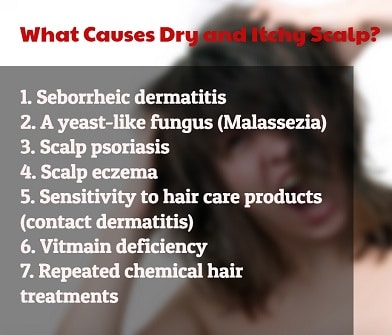
Topical remedies can help, but if symptoms keep returning, identifying the underlying cause (like seb derm, psoriasis, eczema, or product reactions) matters.
If this sounds like you, focus less on adding more products – and more on removing the triggers.
Some of the most common causes of dry scalp are:
1. Seborrheic dermatitis (or seborrhea): This common skin condition causes redness, itching, and flaking anywhere on your body.
Dandruff and seborrheic dermatitis are considered part of the same spectrum; dandruff is typically the milder, scalp-only form.
The exact cause isn’t fully understood, but dermatology sources consistently point to a reaction involving Malassezia yeast, skin oils (sebum), and the immune response. Lifestyle can influence flares, but it isn’t the only factor.
2. A yeast-like fungus (Malassezia) – Malassezia is a yeast that naturally lives on most adult scalps, and usually, it’s harmless.
But for some people, it can trigger irritation, itching, and that stubborn flaking, basically because the scalp reacts with inflammation.
And here’s the part most people miss: even if the yeast is “normal,” things like harsh shampoos, over-washing, heavy styling products, or anything that strips your scalp’s natural protective oils can throw the scalp barrier off – and make the problem much worse.
3. Scalp psoriasis – Psoriasis can cause dandruff-like itching and flaking.
Psoriasis is an autoimmune disease that triggers too many skin cells to grow anywhere on your body, including your scalp.
4. Eczema – though more common in babies and children, Eczema can affect adults too.
Eczema is multifactorial. Some people find certain foods trigger flares, but diet changes don’t reliably ‘cure’ eczema.
Stress can worsen eczema/psoriasis flares.
5. Sensitivity to hair care products (contact dermatitis) – some of us can be sensitive to poison-filled industrial hair products (go figure).
Sensitivity to hair products (contact dermatitis) is common. Fragrance, certain preservatives, and some surfactants can trigger irritation in sensitive people.
Hair products may not be the only culprit.
For example:
I have a friend who discovered that her dry scalp was caused by her Tempurpedic pillow.
She changed her pillow and her problem disappeared in 2 days.
That’s anecdotal – but it’s a good reminder to consider anything that touches your scalp (pillowcases, hats, hair towels, hair dyes).
6. Poor Diet – Poor diet or nutrient gaps may worsen dryness and skin barrier function, but they’re usually one piece of the puzzle rather than the only cause.
7. Lifestyle Habits – repeated chemical hair treatments like permanent color, relaxers, and keratin treatments can sap your scalp of moisture.
Another cause can be a daily blow-drying habit, especially with excessive heat.
Bonus Tips: Prevent a Dry and Itchy Scalp
1. If you’re itchy, simplify your routine: use a gentle, fragrance-free shampoo and avoid heavily fragranced styling products until things calm down.
2. Avoid synthetic hair dyes. Fortunately, more than a few natural ways to color your hair exist. Some of them are the coffee dye, the henna dye, and the chamomile hair brightening method.
3. Examine everything that comes in contact with your hair and scalp. Your dry scalp may be caused by your pillow, your pillowcase or anything that touches your hair.
4. If you suffer from eczema, try an elimination diet to figure out your food sensitivities or eliminate them.
This concludes my top recommendation for dry and itchy scalp relief.
Remember, topical solutions, while effective, are not enough. If you suffer from chronic dandruff / dry and itchy scalp, make sure to find the root cause and treat it accordingly.
If you’re not sure where to start, go back to the first remedy and try just one thing at a time.
To your health and happiness,
Meital
Studies
Al-Waili NS. Therapeutic and prophylactic effects of crude honey on chronic seborrheic dermatitis and dandruff. Eur J Med Res. 2001 Jul 30;6(7):306-8. PMID: 11485891.
Agero AL, Verallo-Rowell VM. A randomized double-blind controlled trial comparing extra virgin coconut oil with mineral oil as a moisturizer for mild to moderate xerosis. Dermatitis. 2004 Sep;15(3):109-16. doi: 10.2310/6620.2004.04006. PMID: 15724344.
Kabara JJ, Swieczkowski DM, Conley AJ, Truant JP. Fatty acids and derivatives as antimicrobial agents. Antimicrob Agents Chemother. 1972 Jul;2(1):23-8. doi: 10.1128/AAC.2.1.23. PMID: 4670656; PMCID: PMC444260.

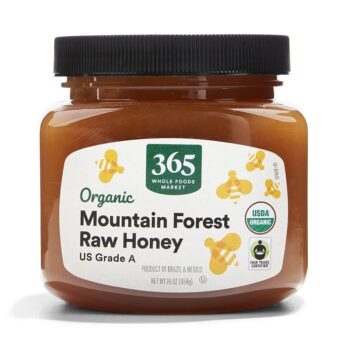
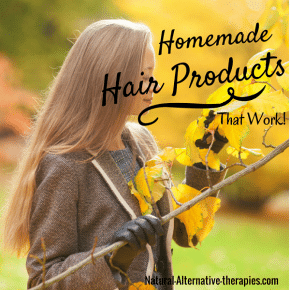
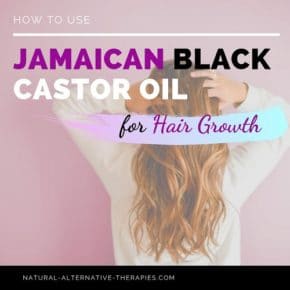
Have you tried using coconut oil with Tea Tree oil? it works wonders for me.
I have an insanely itchy scalp. I thought from hair dye but it’s a hundred times worse. No flakes or bumps. I also have been diagnosed with Grover’s disease for rash all over my body. But scalp itching started way before that. Only much worse now. I’m not having hair dyed now or maybe never again. I’ll be gray!! I’m 70 and look 60 as a blond. But I’m ready to throw my ego out. I’m at a loss.
Yes, there’s no problem with combining these therapies.
Can I use these therapies together i.e. ùse honey then an apple cider rinse? (
Hi, my husband has been suffering from this for years! We have tried essential oils and Indian head massages which help for a couple of days but no long-term fix… Will try the honey and perhaps the aloe vera gel… and see whether they help! Thanks 🙂
How about this one? https://amzn.to/2zsGpOF
Can you recommend an organic shampoo that doesn’t contain tea tree oil? I have searched the web, but it only brings up tea tree oil options. I have thick, straight hair & have always had a dry scalp. I air-dry my hair-always & I don’t use any styling products. The back of my scalp, by my hairline, itches the day after I shampoo my hair. The last salon I went to recommended their tea-tree oil shampoo that was very expensive(Paul Mitchell?). After one use, my itchy scalp was much worse.
I had recently found an all-natural sulfate-free shampoo that worked wonderfully, but I can’t find it in stores anymore and now have forgotten the brand. I think it had rosemary in it. Help?
I was just diagnosed with eczema and the top of my scalp near my forehead was getting dry and flaky patches. It looked like dandruff and it was super embarrassing. I searched right away on google for relief and purchased foderma serum. I started to use it on my scalp and also on my back (where my eczema was the worst) it started to clear up within a week. I like this serum because it’s natural, no steroids or cortisones. It’s not greasy or oily, it’s mostly water with skin-improving ingredients. I’m going to be dealing with eczema for the rest of my life and I will be purchasing more foderma serum for the future.
How did you make it?
I made the all natural itchy scalp shampoo and my hair looks really greasy. Did I use too much?
My daughter has eczema. Foderma serum is the only serum that works for her! I think you’ve just got to find what works for you. I’ve heard I need to try foderma and that and I have, my daughters skin flares from almost everything except this!
I have been using a 3 step hair product that is working for less hair loss and slight regrowth; however the last 2 months my scalp and hair is extremely dry. I have been using coconut and tea tree oil. Retail store employees are clueless. The manufacturer says to go to the retail store for info. Thank you for your info
I researched every shampoo to help my wife that has dandruff and a very itchy scalp. We tried a bunch of them to counteract this – and the best one we found is the Made from Earth Tea & Protein Shampoo.
She has just used this Made From Earth shampoo for the last 2 weeks, and I testify that it is working wonders. She feels the ‘healing’ and tingling of the Tea Tree Oil. All I can say is thank you Made from Earth for helping my wife. It was making her so unhappy not being able to solve her itchy scalp – and I am so grateful she does not have to feel insecure anymore.
You need to use a shampoo that does not have chemicals and has only SOOTHING ingredients. I tried a lot of them – finding one without chemicals is hard. Aloe Vera is soothing…coconut oil is soothing…these are the ingredients you should be looking for in a shampoo. For the last month, I have been using the Somaluxe Shampoo (purchased online at Lady Soma), and it has been great cause it’s super moisturizing…and doesn’t have any chemicals that aggravate my eczema.
Sammy,
I would also recommend trying Organic Castor Oil.
Good luck!
i have psoriasis on my scalp for 30 years want to try the honey treatment wow will let u know tnx sooo much
Hi Jessica:)
Actually, the product I’ve mentioned in the post – The Knotty Boy Dread Shampoo will be perfect for you and your specific needs.
Go see it on Amazon: https://amzn.to/1g6z8on
I’ve been diagnosed with seborrheic dermatitis and I’ve found that going gluten-free has helped tremendously. While I’d love to use some of these options, I have super curly hair and it’s hard to manage on a good day, let alone adding honey to it or trying to get a paste onto my scalp. Any tips/tricks you suggest? I love my long curls, but holy hell, they’re unmanageable some days.
Hi Deborah:)
Thanks for your kind words…I’m starting to look forward to your comments every week, I think I’m getting addicted!:)
I love your blog too and I’ve just followed just about every one of your social media profiles…keep and touch and thanks for dropping by!
Meital
Hi Meital,
There is nothing worse than that annoying urge to scratch my itchy scalp. I am always on the lookout for good natural remedies for my dry and itchy scalp. There are so many harmful ingredients in most commercial hair and scalp care products that for me homemade and natural are the best way to go. As always, I’m enjoying reading many of your other healthy blog posts as well. I’m just pinning, tweeting, and sharing! Thank you so much for sharing these healthy natural remedies with us at the Healthy, Happy, Green & Natural Blog Hop! I appreciate it!
All the best, Deb